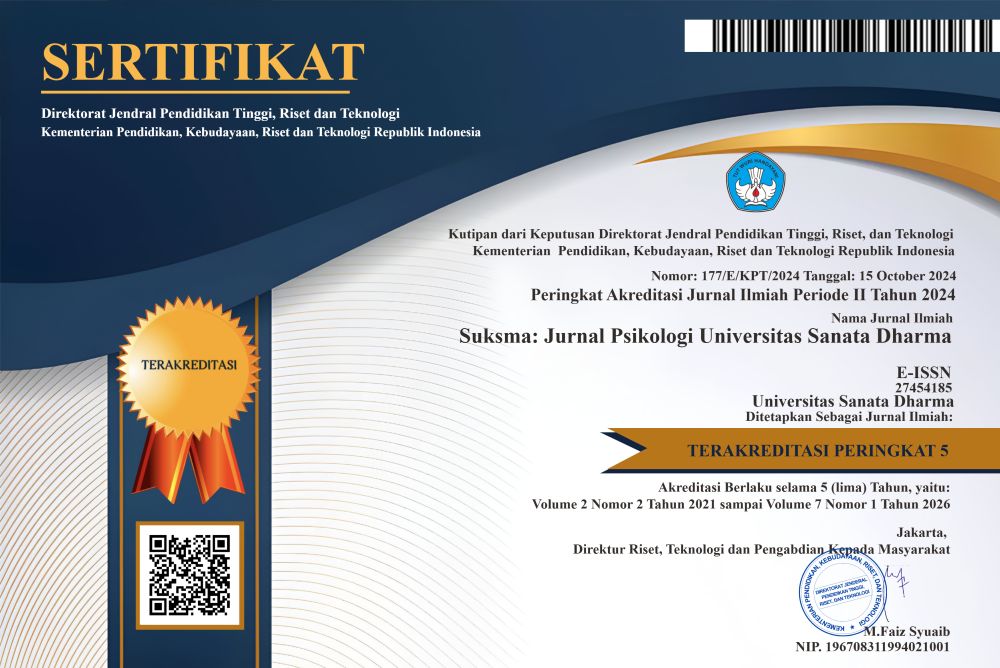Demokrasi di Mata Anak Muda: Studi Representasi Sosial
(1) Universitas Sanata Dharma
(*) Corresponding Author
Abstract
How do young people understand democracy? This study tries to find out the ideas of young people about democracy and its basic structure using the Social Representation approach. Young people aged between 17 to 33 years (N = 237 people) participated in this study. Data collection was carried out using a survey technique by asking them what they thought about democracy and what values they saw as the basic values of democracy. The three main ideas of young people about democracy are freedom of opinion (63.98%), plurality and equality (62.03%) and justice (48.52%). These three ideas are basic values for the formation of assertive citizens and at the same time reflect the need for young people to be independent and participate. Multidimensional scaling statistical techniques are used to summarize and capture the basic structure of 13 ideas about democracy. There are two main dimensions found. The first dimension describes democracy as a tension between the ideas of liberal democracy (freedom of opinion and equality-plurality) and the idea of integralism (prosperity, unity, law and order, responsibility and honesty). The second dimension describes democracy as the tension between the principles of justice and the principles of people's sovereignty (people's sovereignty, deliberations, general elections and togetherness). These two dimensions may reflect the history of the democratic experience of the Indonesian people who have experienced various trials of applying different ideas about democracy.
Keywords
Full Text:
PDFReferences
Almond, G. D., & Verba, S. (1963). The civic culture, political attitudes and democracy in five nations. Sage Publications.
Augostinos, M. (1998). Social representations and ideology: towards the study of ideological representations. In U. Flick, The Psychology of Social (pp. 156-169). Cambridge University Press.
Barbu, Z. (2010). Democracy and dictatorship their psychology and patterns of life. Routledge.
Beetham, D., & Boyle, K. (2000). Demokrasi 80 tanya jawab. Kanisius.
Bourchier, D. (2007). Pancasila versi orde baru dan asal muasal negara organis (integralistik). Pusat Studi Pancasila UGM dan Aditya Media.
Bourchier, D., & Hadiz, V. R. (2003). Indonesian politics and society. RoutledgeCurzon.
Cunningham, F. (2002). Theories of democracy: A critical introduction. Routledge.
Dalton, R. J., & Welzel, C. (2014). The civic culture transformed: From allegiant to assertive citizens. Cambridge University Press.
Dalton, R. J., & Welzel, C. (2014). Political culture and value change. In R. J. Dalton, & C. Welzel (Eds.), The Civic Culture Transformed Fromm Allegiant to Assertive Citizen (pp. 1-18). Cambridge University Press.
Dalton, R., Shin, D., & Jou, W. (2007). Popular conceptions of the meaning of democracy: Democratic understanding in unlikely places. CSD Working Papers, Publication Date: 05-18-2007. https://escholarship.org/uc/item/2j74b860.
Erikson, E. H. (1987). Childhood and society. Paladin Grafton Book.
Etzioni, A. (1996). The responsive community: A communitarian perspective. American Sociological Review, 61(1), 1-11.
Flick, U. (1998). Introduction: social representations in knowledge and language as approaches to a psychology of the social. In U. Flick, The Psychology of The Social (pp. 1-14). University Press: Cambridge.
Hansen, M. A., & Goenaga, A. (2021). Gender and democratic attitudes: do woman and man prioritize different democratic institutions? Politics & Gender, 17(1), 23-52.
Huntington, S. P. (1996). The clash of civilization and the remaking of world order. Simon & Schuster.
Kesici, S. (2008). Democratic teacher beliefs according to the teacher's gender and locus of control. Journal of Instructional Psychology, 35(1), 62-69.
Kim, S. Y. (2010). Do asian value exist? empirical tests of the four dimensions of asian values. Journal of East Asian Studies, 10(2), 315-344.
Marcuse, H. (2002). One-dimensional man, studies in the ideology of advance industrial society. Routledge Classics.
Mihardja, A. K. (1998). Polemik kebudayaan. Balai Pustaka.
Moodie, E., & Markova, I. (1995). Lay representation of democracy. A study in two culture. Culture & Psychology, 1, 423-453.
Moscovici, S. (1998). The history and actuality of social representations. In U. Flick, The Psychology of The Social (pp. 209-247). Cambridge University Press.
Przeworski, A. (2010). Democracy and the limits of self-government. Cambridge University Press.
Sotirakopoulou, K. P., & Breakwell, G. (1992). The use of different methodological approaches in the study of social representations. On Going Production on Social Representations, 1(1), 29-38.
von Cranach, M. (1998). The knowledge of social systems. In U. Flick, The Psychology of The Social (pp. 15-40). Cambridge University Press.
Welzel, C., & Dalton, R. (2016). Cultural change in Asia and beyond: From allegiant to assertive citizens. Asian Journal of Comparative Politics, 1-21.
Welzel, C., & Dalton, R. J. (2014). From allegiance to assertive citizen. In R. J. Dalton, & C. Welzel (Eds.), The Civic Culture Transformed From Allegiant to Assertive Citizen (pp. 282-306). Cambridge University Press.
DOI: https://doi.org/10.24071/suksma.v4i1.6049
Refbacks
- There are currently no refbacks.


